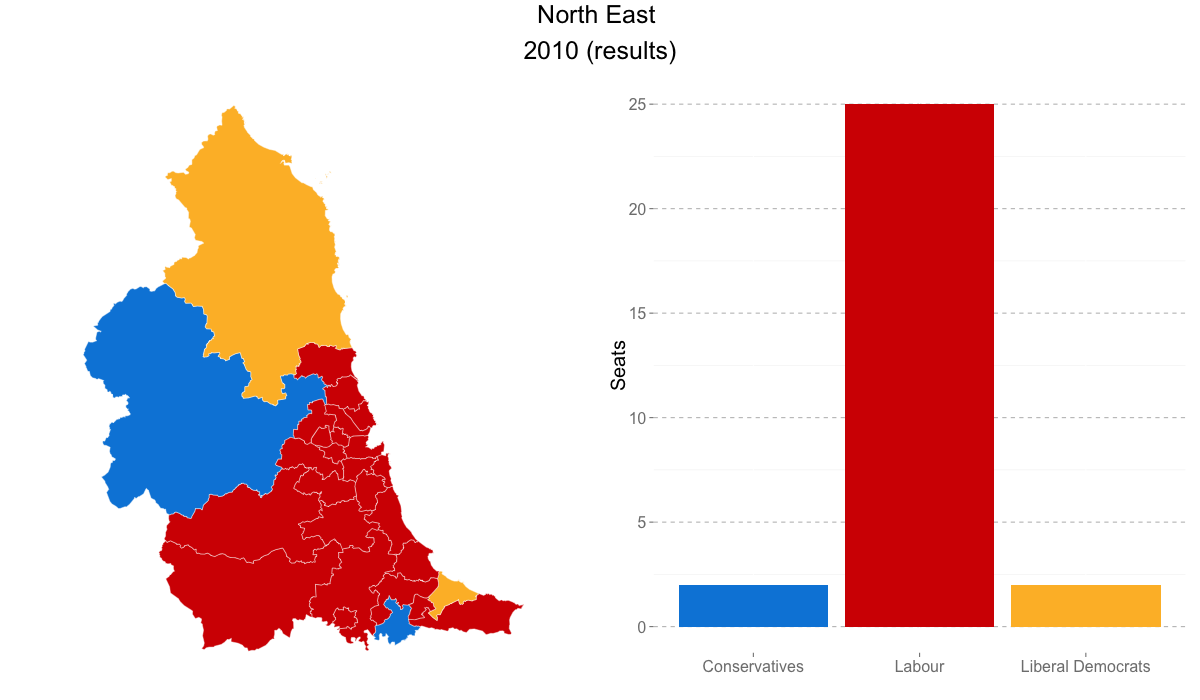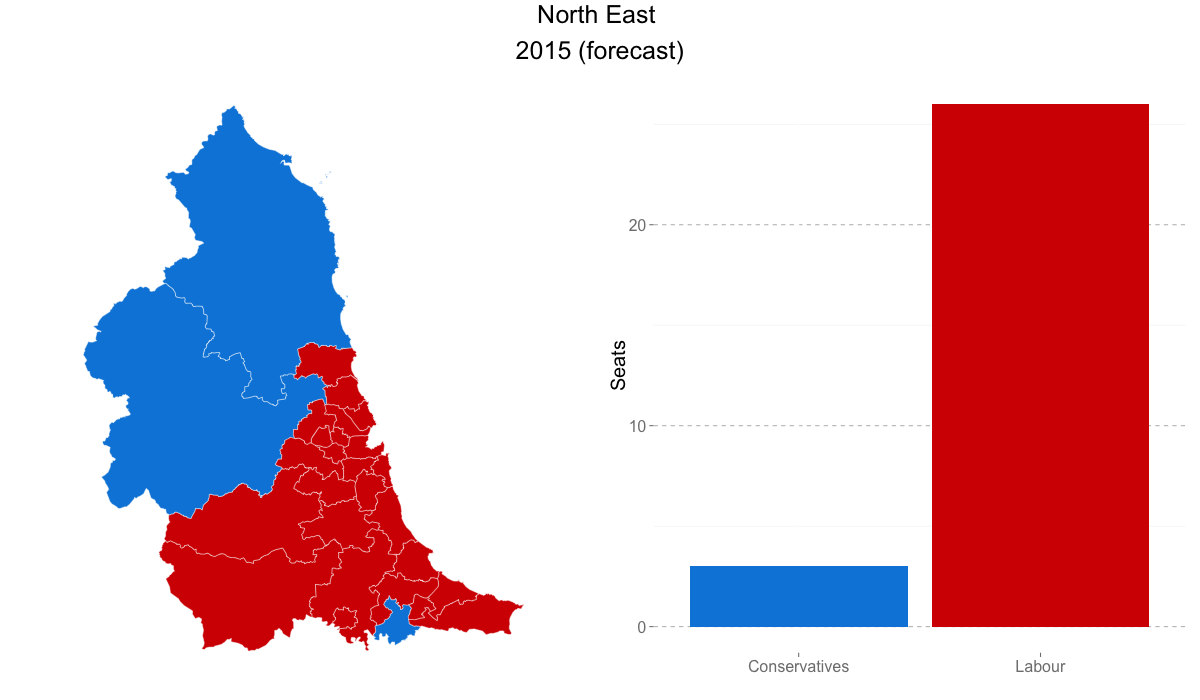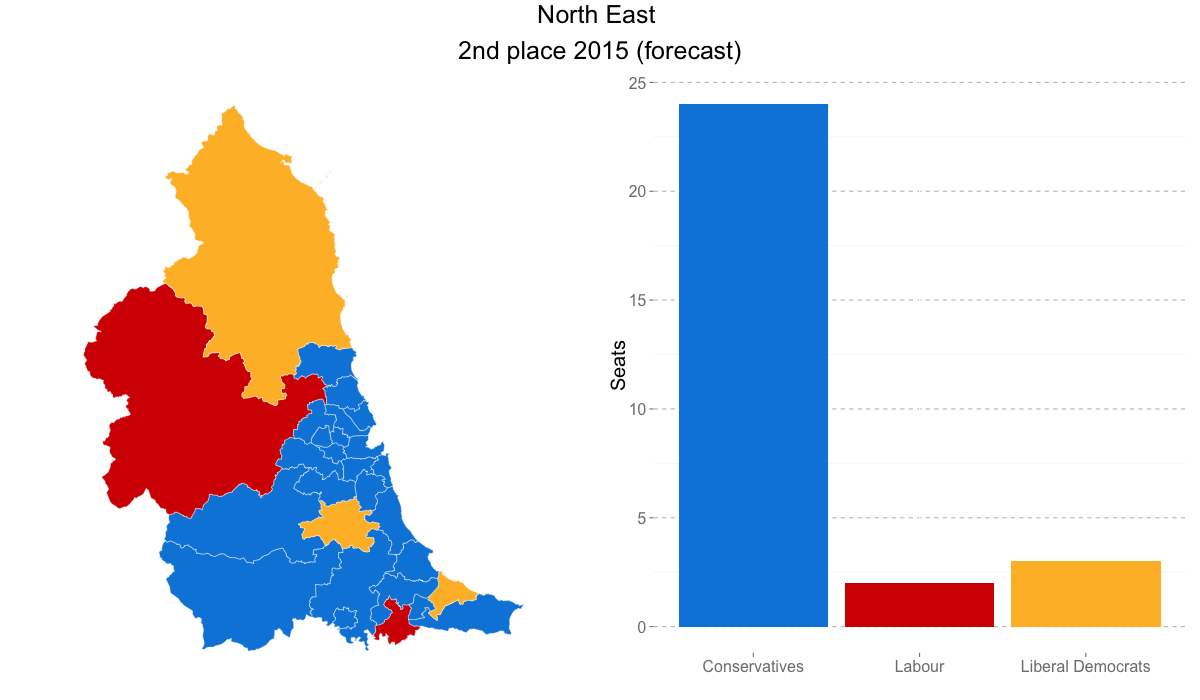In this post, the team at electionforecast.co.uk discuss their current predictions for the North East. They find that the traditional two-party system is still strong in the region, and that although Labour may pick up a couple of seats at the expense of the Liberal Democrats, it is unlikely that the partisan distribution of North East MPs will change dramatically in 2015.
See Gidon Cohen’s analysis of the campaign in the North East here.
In 2010, the 29 constituencies in the North East of England were canonical examples of the traditional party system in the UK. The Conservatives were the main competition to the regionally-dominant Labour Party in 14 constituencies, including Darlington, Hartlepool, Jarrow, Middlesbrough South and East Cleveland, Stockton North and South, and Tynemouth.
In other areas, the Liberal Democrats challenged Labour in constituencies such as the City of Durham, North West Durham, Gateshead, Middlesbrough, and Newcastle upon Tyne Central, East, and North. The Liberal Democrats and the Conservatives were the top two parties in just two constituencies: Berwick-upon-Tweed and Hexham.
The plot and map below show the seats won by each party at the 2010 election.
Our headline forecasts for the region suggest that there will not be a dramatic change in the distribution of seats in 2015. The graph below shows our predictions for each constituency in the region. Our current prediction is that Labour will win 26 seats, and the Conservatives will win 3. Our forecasts imply that the only seats likely to change hands at the upcoming election are those held by the Liberal Democrats. We predict that Berwick-upon-Tweed will swing from the Lib Dems to the Conservatives, and that Redcar will be a Labour gain.
Another interesting feature of the competition in this region is that the average forecast margin of victory is likely to be larger in the North East than in any other electoral region in the UK. This reflects the fact that the UK wide swing toward the Labour Party, relative to 2010, will serve to reinforce the position of the party in the North East.
Finally, the plot below – which show our predictions for the second-place party in each constituency – suggests that the party system in the North East is unlikely to be affected by the ‘insurgent’ parties that are gaining strength in other parts of the UK. We predict that UKIP will win approximately 11% of the popular vote in the North East, but because of the inefficient distribution of UKIP votes across the region, this is unlikely to make the party competitive in any particular constituency.
The main change from 2010 is that the Conservatives will replace the Liberal Democrats as the main challenger to Labour in the region. In 2010, the Lib Dems came second to Labour in 13 of 29 constituencies. In 2015, by contrast, we expect the Lib Dems to gain the electoral silver medal in only 3 constituencies (Berwick-upon-Tweed, Redcar, and the City of Durham).
Overall, our forecasts largely agree with Gidon Cohen’s conclusion that “the 2015 General Election won’t be decided by dramatic changes in the North East”. The collapse of the Liberal Democrats is likely to be a feature across electoral regions in the UK, but the North East is unlikely to witness significant challenges from the ‘insurgent’ parties that are likely elsewhere. We will continue to update our forecasts with new polling data as it is released, and updated forecasts for the North East, as well as for the rest of the UK, can be found at our website.
Note: Forecasts are accurate as of April 10th, 2015.
 Jack Blumenau is a PhD candidate in Government at the London School of Economics.
Jack Blumenau is a PhD candidate in Government at the London School of Economics.
 Chris Hanretty is a Reader in Politics at the University of East Anglia.
Chris Hanretty is a Reader in Politics at the University of East Anglia.
 Benjamin Lauderdale is an Associate Professor in Methodology at the London School of Economics.
Benjamin Lauderdale is an Associate Professor in Methodology at the London School of Economics.
 Nick Vivyan is a Lecturer in Quantitative Social Research at the Durham University.
Nick Vivyan is a Lecturer in Quantitative Social Research at the Durham University.









2 Comments